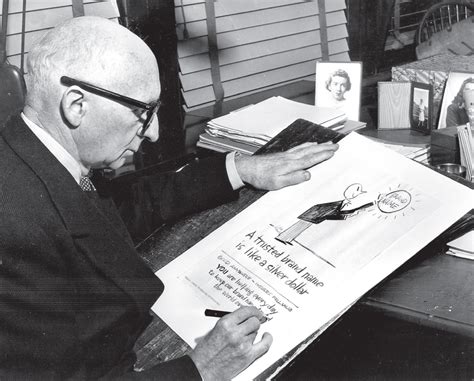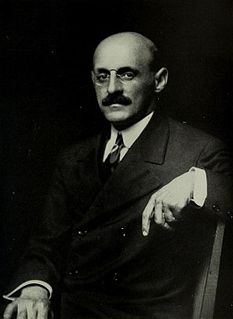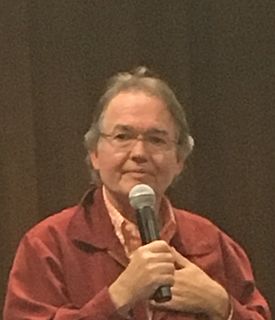A Quote by Carl Jung
It seems to be very hard for people to live with riddles or to let them live, although one would think that life is so full of riddles as it is that a few more things we cannot answer would make no difference. But perhaps it is just this that is so unendurable, that there are irrational things in our own psyche which upset the conscious mind in its illusory certainties by confronting it with the riddle of its existence.
Related Quotes
You don’t have to know a lot of things for your life to make a lasting difference in the world. But you do have to know the few great things that matter, perhaps just one, and then be willing to live for them and die for them. The people that make a durable difference in the world are not the people who have mastered many things, but who have been mastered by one great thing.
If I had my life to live over, I would try to make more mistakes. I would relax. I would be sillier than I have been this trip. I know of very few things that I would take seriously. I would be less hygienic. I would go more places. I would climb more mountains and swim more rivers. I would eat more ice cream and less spinach. I would have more actual troubles and fewer imaginary troubles.
At no period of [Michael Faraday's] unmatched career was he interested in utility. He was absorbed in disentangling the riddles of the universe, at first chemical riddles, in later periods, physical riddles. As far as he cared, the question of utility was never raised. Any suspicion of utility would have restricted his restless curiosity. In the end, utility resulted, but it was never a criterion to which his ceaseless experimentation could be subjected.
Obviously, psychologically, it would make all the difference in the world. But I think it would also make a big difference financially. If people understood, that, "Y'know, having all those things, that I was told I was supposed to have, to be successful, really is not a measure of success, and I can't have them anyway -" Yeah, that would make a big difference. It would've made a big difference, I think, in my life.
But mark, madam, we live amongst riddles and mysteries--the most obvious things, which come in our way, have dark sides, which thequickest sight cannot penetrate into; and even the clearest and most exalted understandings amongst us find ourselves puzzled and at a loss in almost every cranny of nature's works.
For myself, I am interested in science and in philosophy only because I want to learn something about the riddle of the world in which we live, and the riddle of man's knowledge of that world. And I believe that only a revival of interest in these riddles can save the sciences and philosophy from an obscurantist faith in the expert's special skill and in his personal knowledge and authority.
I've heard fate talked of. It's not a word I use. I think we make our own choices. I think how we live our lives is our own doing, and we cannot fully hope on dreams and stars. But dreams and stars can guide us, perhaps. And the heart's voice is a strong one. Always is. Your heart's voice is your true voice. It is easy to ignore it, for sometimes it says what we'd rather it did not - and it is so hard to risk the things we have. But what life are we living, if we don't live by our hearts? Not a true one. And the person living it is not the true you.
But the solution to the riddle of life and space and time lies outside space and time. For, as it should be abundantly clear by now, nothing inside a frame can state, or even ask, anything about that frame. The solution, then, is not the finding of an answer to the riddle of existence, but the realization that there is no riddle. This is the essence of the beautiful, almost Zen Buddhist closing sentences of the Tracticus: "For an answer which cannot be expressed the question too cannot be expressed. The riddle does not exist."
Be patient toward all that is unsolved in your heart and try to love the questions themselves, like locked rooms and like books that are now written in a very foreign tongue. Do not now seek the answers, which cannot be given you because you would not be able to live them. And the point is, to live everything. Live the questions now. Perhaps you will then gradually, without noticing it, live along some distant day into the answer.
It may be said that myths give to the transcendent reality an immanent, this-worldly objectivity. Myths speak about gods and demons as powers on which man knows himself to be dependent, powers whose favors he needs, powers whose wrath he fears. Myths express the knowledge that man is not master of the world and his life, that the world within which he lives is full of riddles and mysteries and that human life also is full of riddles and mysteries.
Our lives are more like fragmentary dreams than the enactments of conscious selves. We control very little of what we most care about; many of our most fateful decisions are made unbeknownst to ourselves. Yet we insist that mankind can achieve what we cannot: conscious mastery of its existence. This is the creed of those who have given up an irrational belief in God for an irrational faith in mankind.
To say that I have found the answer to all riddles of the soul would be inaccurate and presumptuous. But in the knowledge I have developed there must lie the answers to that riddle, to that enigma, to that problem - the human soul - for under my hands and others, was seen the best in man rehabilitated. I discovered that a human being is not his body and demonstrated that through Scientology an individual can attain certainty of his identity apart from that of the body. We cannot deal in the realm of the human soul and ignore the fact.





































